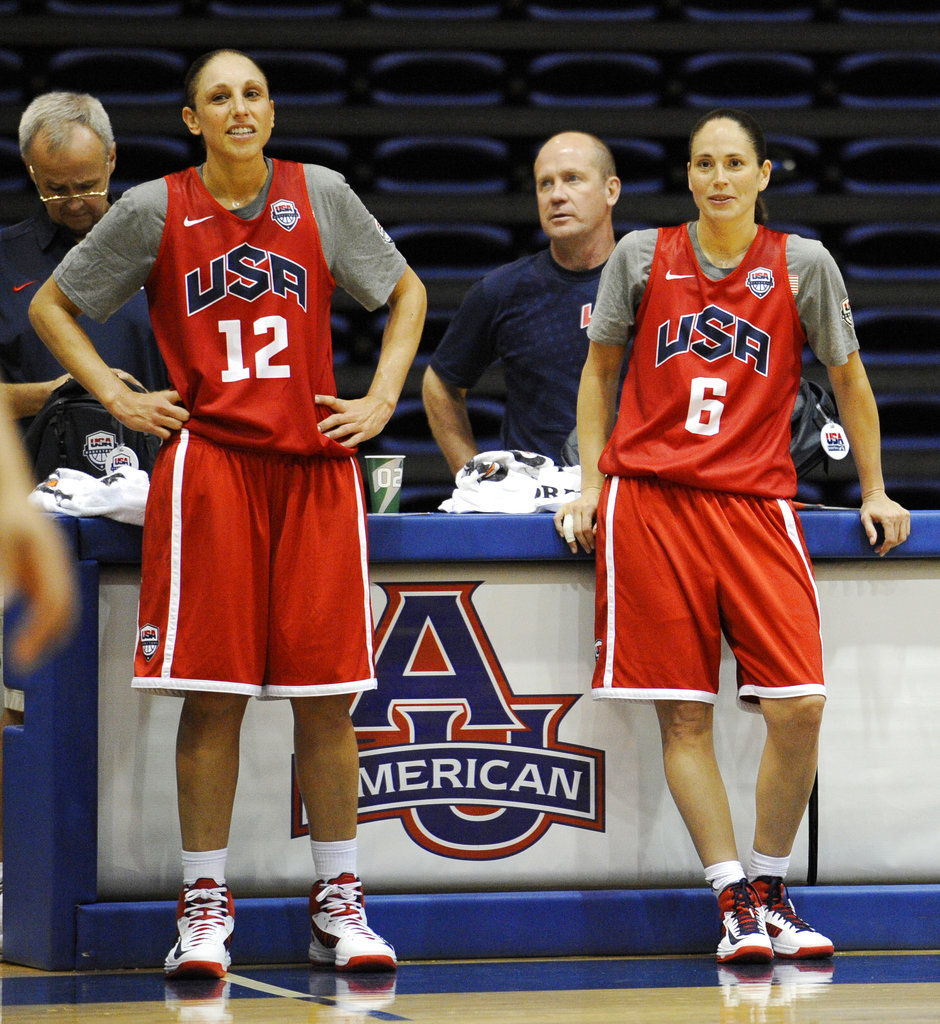
FILE – In this July 14, 2012, file photo, U.S women’s Olympic basketball players Diana Taurasi (12) and Sue Bird (6) watch during practice in Washington. For nearly a decade the duo was playing over 100 games a year around the world and barely getting any time off to rest and recover. Besides making the lifestyle changes, the USA Basketball mainstays are now just playing in the WNBA, not putting the additional wear-and-tear on their bodies. Both players credit the changes off the court for the success on the court. (AP Photo/Nick Wass, File)
SAN CRISTOBAL DE LA LAGUNA, Spain — Veterans Sue Bird and Diana Taurasi each had one of their best WNBA seasons.
Both players credit changing the way they take care of their bodies off the court for their successes on it. Eating healthier, getting more rest and doing more stretching has helped. Also, the USA Basketball mainstays are only playing in the WNBA during the summer and not overseas in the offseason.
For nearly a decade, the duo played more than 100 games a year with little time for rest and recovery. WNBA players make most of their money playing in more lucrative leagues in Russia, China and Europe during the winter.
“I think there’s so much more information on diet and recovery and taking care of the body,” said the 36-year-old Taurasi. “In my career, my first couple of years, until now. I changed the way I lived my life — from what I eat to how I rest. Therapy to the stuff off the court that makes sure you are fit on the court. I had to change the way I looked at basketball and myself and my career.”
Bird made the changes a few years back and credits working with sports performance consultant Susan King Borchardt. It’s clearly paid off, with Bird and her Seattle Storm teammates winning the WNBA title this month.
“She’s the one I credit for saving my career,” said Bird, who turns 38 next month. “I started working with her four years ago, do the math.”
One innovation Bird uses is the WHOOP fitness tracker. It’s a little black band on her wrist, along with teammates Breanna Stewart and Jewell Loyd.
“Basically, it’s a heart monitor, on top of that, it has a unique tracking system that helps you with your recovery,” Bird said. “It monitors if you have a workout, what your heart rate is, how hard your workout was. Where it really comes in will be to tell you how much sleep they recommend for you that night. Tonight, you need eight hours or 10 hours, it varies.”
For the past year and a half, Bird answers a few questions on her phone and the WHOOP app tells her how much sleep she got. That data is also available to Borchadt. They come up with a plan to figure out what Bird needs for peak performance.
The younger players have taken notice. Stewart, the WNBA MVP of the regular season and finals, approached Bird in late March about her routine.
“The thing she said is that you have to be all the way invested in it, you can’t do it (halfway),” Stewart said. “I said ‘Would you do this if it was available when you were 23?’ and she said ‘Absolutely. It’s a no-brainer.’ I want to have as successful a career as Sue has had and to play that long. Do it early. Change my diet. Not just going hard in basketball workouts, but doing things to make sure I’m well-rounded in all areas of my life.”
Dawn Staley played with Bird and Taurasi on a few Olympic and World Cup teams. Now she is coaching them on the U.S. national team.
“You’re looking at iconic figures in our sport,” Staley said. “We see what they’ve done on the court. The sacrifices they’ve added to their lifestyle should be commended and what younger players should implement in their lives.
“Am I amazed? Not at all. I’ve seen them grow up. First-time Olympian, first-time World Cup participants, I knew back then. The basketball part of it will take them a long way. What they’ve added to their diets and lifestyles, they’ve already beaten Mother Time to be able to play at a high level today.”
Bird and Taurasi deflect questions about retirement and who can blame them. Bird helped Seattle win its third WNBA title. Taurasi had Phoenix within a game of reaching the championship round before falling to her friend’s team.
Neither hesitated about joining USA Basketball again. Bird is playing in a record fifth World Cup and Taurasi in her fourth. Both know they don’t have to do much heavy lifting for the U.S.
“I think that’s one thing about USA Basketball that’s nice, is that the load is going to be distributed evenly. Everyone has a little piece,” Taurasi said. “Literally, I come down, pass the ball to the best post players in the world and wait for an open 3. That’s my job for USA Basketball for 12 years. I’m really content with that.”
Asked if she could do it another 12 years, Taurasi smiled and said, “Why not?”

